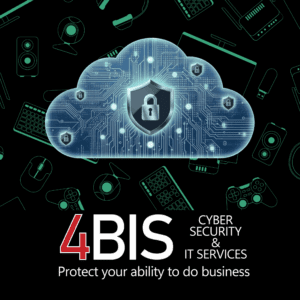Businesses in Cincinnati are constantly searching for innovative ways to improve efficiency, increase productivity, and stay ahead of competitors. One of the biggest technology questions many leaders ask is:
Should we move our business to the cloud?
The answer isn’t the same for every organization. This guide from 4BIS Cyber Security, a trusted cloud security provider in Cincinnati, explains the pros, cons, costs, and security considerations of cloud migration.
What is Cloud Computing?
Cloud computing refers to accessing servers and services through the internet rather than keeping equipment in your office.
Examples you may already use include:
- Email (Gmail, Outlook, Yahoo!)
- File storage and sharing (Google Drive, OneDrive, Dropbox, SharePoint)
- Business software (SaaS applications like Salesforce, QuickBooks Online, or Teams)
In short: on-premise servers = equipment you own or lease in your office.
Cloud servers = equipment in secure data centers, managed by a provider, accessed online.
Is the Cloud Cheaper than On-Premise Servers?
Sometimes, but not always.
- On-premise servers usually cost more upfront (a project may run $9,000+).
- Cloud servers are subscription-based, which lowers startup costs but may cost more long-term.
This is often about CapEx (capital expense) vs. OpEx (operating expense). Some companies prefer to avoid upfront spending, while others save more by investing in on-premise equipment.
Hidden Costs: Public cloud providers (AWS, Google Cloud, etc.) often have confusing pricing. Extra bandwidth, faster storage, or premium support can quickly inflate monthly bills.
One of the biggest hidden costs is internet speed. If employees are slowed down by lagging connections, you may need to upgrade internet service sometimes at thousands of dollars per month.
Is the Cloud More Secure?
Cloud computing can improve security, but it depends on your setup.
Cloud advantage: Email systems like Microsoft 365 are more secure than running an on-premise Exchange server. They reduce exposure to large-scale network hacks.
Cloud advantage: Remote workers connect more safely through cloud platforms than VPNs.
On-prem advantage: If your team works entirely onsite, keeping data in-house may be more secure since you control every access point.
At 4BIS Cyber Security, we recommend private or hybrid cloud solutions for many Cincinnati businesses because they provide better balance between convenience and security.
Important: Cloud providers protect infrastructure, but user mistakes are still your responsibility. If an employee shares a password or falls for phishing, the provider isn’t liable.
How Does Cloud Migration Affect Disaster Recovery?
Every business must plan for downtime, cyberattacks, or system failures.
- On-premise servers: You control backups, retention, and testing but it takes work.
- Cloud services: Providers handle backups, but recovery time and retention depend on their systems. For example, Microsoft 365 replicates data but doesn’t provide true backups.
When planning, ask yourself:
- RPO (Recovery Point Objective): How much data can I afford to lose? Hours? Minutes?
- RTO (Recovery Time Objective): How quickly do I need to be back online?
The stricter your needs, the more advanced (and costly) your backup solution may be.
What Are the Downsides of Cloud Migration?
Moving to the cloud isn’t risk-free. Some challenges include:
- Support delays: Public cloud providers may require third-party intervention. A 4BIS client once faced monthly downtime because their provider’s admin lived hours away from the data center. After moving to our private cloud in Cincinnati, the issue disappeared.
- Compliance issues: HIPAA, PCI, and other regulations may require that sensitive data stay in the U.S. or be stored on isolated systems. Not all providers guarantee compliance.
How to Choose a Cloud Provider in Cincinnati
When evaluating cloud migration services in Cincinnati, ask:
- Does the provider have certified staff and a strong track record?
- Are they financially stable and reliable long-term?
- Do they provide regular patching, backups, and physical security?
- Do they offer hybrid solutions if a full migration isn’t right for your business?
At 4BIS, we recommend that Cincinnati companies also ask themselves:
- Do most employees work in-office or remotely?
- Do we have space for on-premise equipment?
- Is our internet fast and reliable enough for cloud services?
- Are we subject to industry compliance regulations (HIPAA, PCI, etc.)?
What is the Cloud Migration Process?
Migrating to the cloud should never be rushed. A typical process includes:
- Workload assessment – Which applications and data are moving?
- Choosing the right model – Public, private, or hybrid cloud.
- Testing – Running small pilots before moving everything.
- Data conversion and migration – Ensuring compatibility.
- Employee onboarding – Training staff on new tools.
Because migrations require bandwidth, planning, and expertise, most businesses partner with a trusted IT provider in Cincinnati like 4BIS Cyber Security to reduce risk.
What is the ROI of Cloud Migration?
- Cloud pros: Lower upfront costs, easier scalability, better for remote teams.
- Cloud cons: Ongoing fees, reliance on internet speed, less control.
- On-prem pros: Lower long-term cost, more control, compliance-friendly.
- On-prem cons: High startup cost, requires physical space and cooling.
For many organizations, the best approach is a hybrid cloud solution in Cincinnati using cloud for flexibility while keeping sensitive or compliance-heavy systems in-house.
Cloud Migration FAQs
Does the cloud support remote workers better?
Yes. Cloud providers typically have redundant internet and infrastructure, making remote access more reliable.
What’s the difference between cloud computing and cloud storage?
- Cloud computing = actively using applications or servers in the cloud.
- Cloud storage = storing files, photos, and data in the cloud (Google Drive, iCloud, Dropbox).
How does cloud storage work?
Files are uploaded to a secure server over the internet. Employees log in through a portal or app to access them.
Cloud Security Solutions with 4BIS Cyber Security
Migrating to the cloud is not just a technical choice it’s a business strategy. Done correctly, it boosts efficiency, protects sensitive data, and positions your company for growth. Done poorly, it can lead to unexpected costs and risks.
At 4BIS Cyber Security, we help Cincinnati businesses navigate cloud migration with confidence. Whether you need cloud security, hybrid cloud solutions, or compliance-focused IT services, our team ensures your systems are secure, efficient, and aligned with your goals.
Based in Cincinnati, we specialize in cloud migration services for small businesses and mid-sized organizations that need a trusted local partner.

